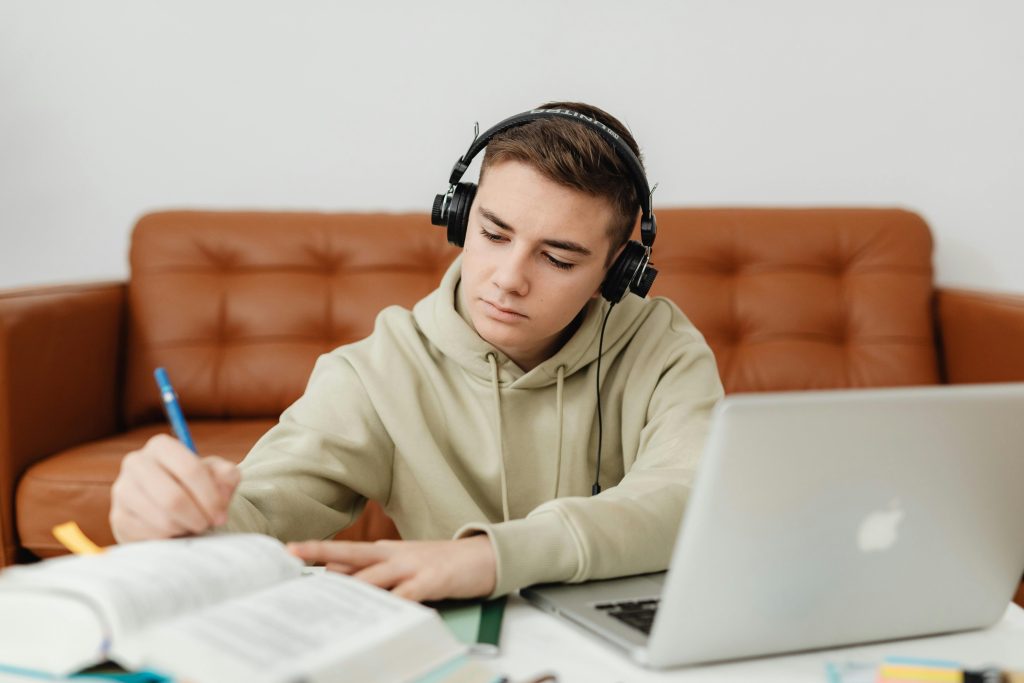You are going to be deeply involved in the study process. Your notes are open, and your laptop is ready. But your mind? It starts to drift. A distracting smartphone, cars outside, voices from the neighborhood — they all pull you away, and you are looking for a way to concentrate. One of the most effective tools for focusing on study is music, no matter how surprising it may seem.
It is not magic. It is brain science. To deal with growing deadlines, some also look for academic help. Many opt to buy assignment online when they need support from professionals for university and college tasks. When you combine useful habits with the right kind of help, studying feels less like a battle.
Read on to find out how music affects your brain when studying, writing assignments and why so many educators and scientists consider it a helping hand when it comes to concentration.
What Music Does to Your Brain
It is powerful in many ways. A steady beat, soft melody, or even gentle background noise — all of it sparks activity in your brain. It lights up the parts linked to memory, attention, and emotion, helping your brain work more effectively and catch the information that is flowing.
Some types of music can even help you enter a “flow state.” That is when you feel fully focused. You forgot the clock. You get more done. A 2023 study from the University of Helsinki found that students who listened to ambient music during study tasks worked 35% more efficiently.
But not all music helps. Lyrics can distract you. Loud changes in rhythm break your focus. That is why instrumental tracks work best. They do not steal your attention. They just help you continue listening and perceive the melody while working on your assignment tasks.
Music as a Habit

Listening to music before studying is not just background noise. It becomes a signal. Once you press play, your brain gets the hint — it is time to focus. Doing this often turns it into a habit — a healthy loop. Wake up, settle in, press play, and study. Even when you are not in the mood, this small step can help. Your playlist becomes your study partner.
Match the Music With the Task
Different tasks need different types of focus. And music can match that. Here is a quick guide:
- Reading. Soft white noise or natural sounds block out distractions. Just don’t make it laud to get immersed in the book.
- Writing. Lo-fi beats or quiet piano help with flow and rhythm. If you need to write an essay or another assignment, just go for it.
- Learning by heart. Baroque classical melody supports memory and learning. Make it silent and start memorizing the information.
Choosing music on purpose helps you stay immersed longer, which saves time. You make fewer errors, and you get things done. Still, even with music, some tasks feel too big. That is why some students look into buying assignments. It is not about taking shortcuts. It is about handling the pressure. Smart support can keep you moving forward.
Music vs Silence: What Works Best for Study
Some believe silence is better. For a few, that might be true. But total silence is rare. Even libraries have sounds. Music masks sudden noises, like someone laughing nearby or a phone buzzing. It gives your brain something steady to hold onto. That helps you stay calm and focused. Plus, music lifts your mood. Studying feels lighter when your favorite soundtrack is playing. It is a small win, but it matters.
How to Make a Music-Study Process a Habit
There is no magic tool to study well, but you can incorporate listening to music into your workflow and make it a habit. Building a soundtrack habit is simple. Try this:
- Pick a platform. You can try Spotify, YouTube, or Brain.fm. Just create a playlist and always have your favorite tracks at hand.
- Go for instrumentals. Avoid lyrics. The last thing you want is to memorize lyrics instead of an important presentation.
- Set a timer. Let the playlist guide your session — 25 or 45 minutes. Then, you can turn it off and continue your study routine.
- Stick with it. Use it every day. Your brain will naturally catch on, and you will want more. Doing assignments may transform into a pleasant routine.
Over time, just hearing the first notes will help you settle into work mode.
The Role of Academic Help

Busy students juggle classes, jobs, and life. It is a lot. Staying focused for hours is tough. That is why smart habits — like study soundtracks — help. And when things pile up, academic support also plays a role. Some students buy assignments when they need a lifeline. The goal is balance. The right support, used wisely, keeps stress in check.
Studies keep showing how music helps learning. One paper in Frontiers in Psychology said that steady background melody helped students concentrate for 40% longer than silence.
Another study from Stanford said classical music helped with information flow. The rhythms help your brain predict what is coming — which makes it easier to stay focused. Many students now use it not just to relax but to study. And it works.
What Real Students Say
Alex, a law student, says, “Film scores help me block out everything. I hit play, and my brain knows — time to work.”
Sara, in nursing school, swears by lo-fi beats. “It is my go-to when I have to memorize long lists. The rhythm keeps me in it.”
Some also mention academic help. They say that option to order assignments online during crunch weeks helped them stay on track. Combined with strong habits like music routines, wellness tips kept things manageable.
Wrapping Up: Does Music Really Help Study?
Today’s students face endless distractions. But many are finding new ways to stay focused. Soundtracks help. They cue your brain to start. They block out stress. They turn study time into deep work time.
When paired with smart strategies — like getting enough rest, using timers, or even buying assignments when things get overwhelming — study becomes smoother, not perfect, but better. So, when focus feels far away, reach for your headphones next time. Let the rhythm carry you. You may be surprised how far it takes you.











